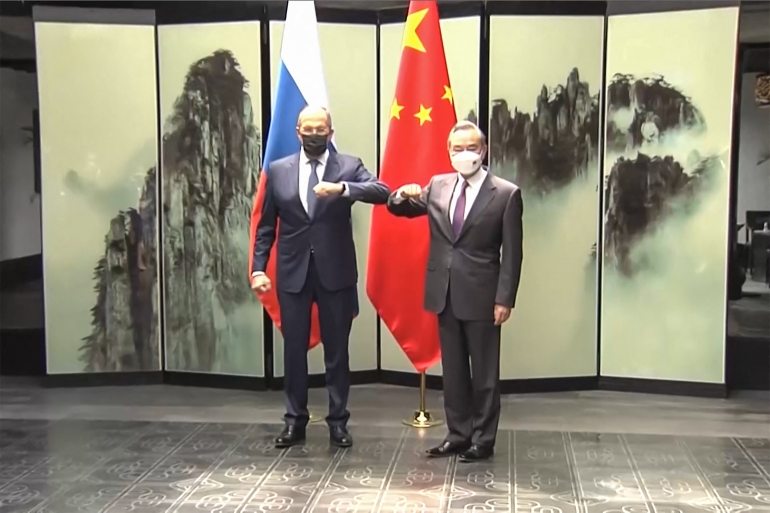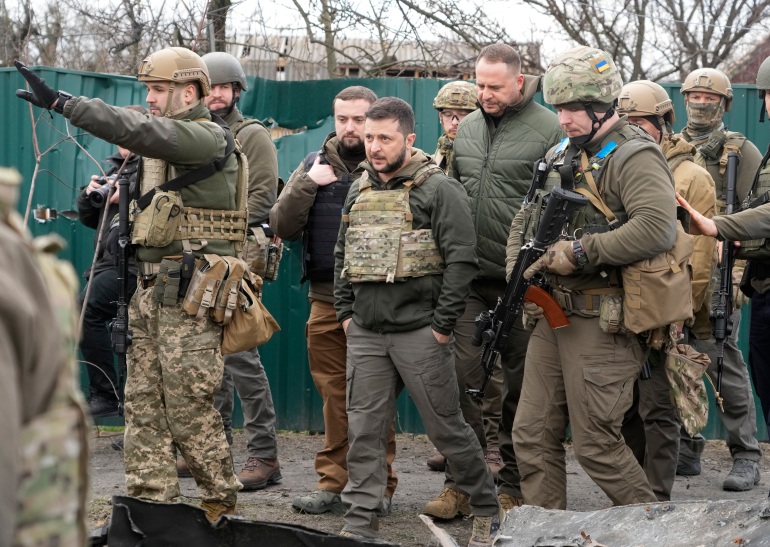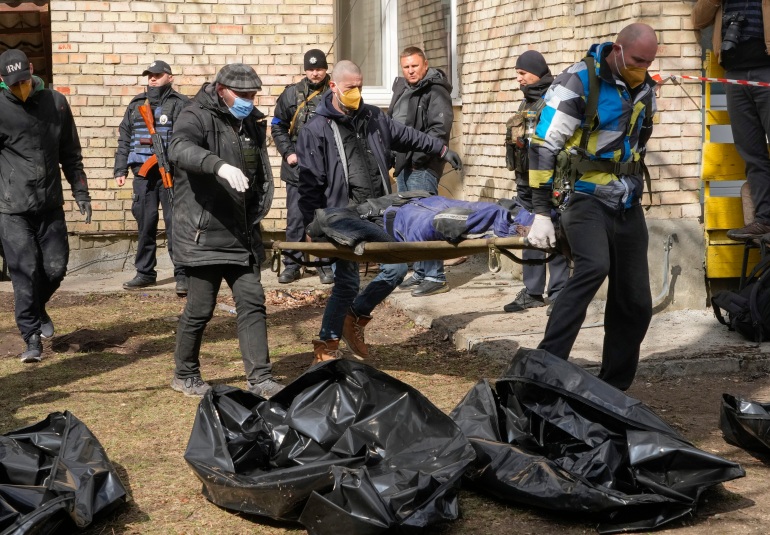Russia-Ukraine war: In Chinese media, the US is the villain
Hong Kong, China – China may portray itself as a neutral party in the war in Ukraine, but the message it communicates to its audience at home tells a different story.
State news agency Xinhua calls the war “a special military operation” and “the Russia-Ukraine crisis” but never refers to it as an invasion. CCTV, the state broadcaster, mentioned civilian casualties for the first time only three weeks after Russia invaded. More recently, state outlets doubled down on the Russian conspiracy theory claiming the US is funding the development of biological weapons in Ukraine, including migratory birds that could spread avian viruses in Russia.
How the war has been framed in Chinese state media is a reflection of where the government stands.
China has not condemned Russia over the invasion of a sovereign nation with which Beijing has strong economic ties, instead talking of “legitimate security concerns” that need to be discussed by “all parties”. And while there has been outrage in the West over the discovery in recent days of civilians allegedly killed by Russian troops in Bucha, coverage in Chinese state media has been brief, despite a recent subtle shift of tone to acknowledge the human toll.
Since the start of hostilities more than a month ago, one theme has remained consistent: the United States is the villain.
China’s relations with Russia have come under even closer scrutiny since the two countries declared a “no limits” partnership in early February.
“We should understand information as part of that,” said David Bandurski, co-director of the China Media Project, who noted that there is a long history of cooperation between Chinese state outlets and Russian agencies such as Sputnik and Russia Today.

As the conflict has continued, Chinese state media have lent their platforms to amplify Russian propaganda. State outlets cite Kremlin officials and Russian state media as their news sources, and receive regular state directives that guide their reports, according to China Digital Times, a US-based bilingual news website.
US portrayed as instigator
Similarly, the few Chinese journalists reporting from the ground have tended to parrot Russia’s favoured news lines.
As one of the few foreign journalists embedded with the Russian army, Lu Yuguang, the Moscow correspondent of the state-affiliated broadcaster Phoenix News, interviewed Russian soldiers and the separatist leader Denis Pushilin. Lu also reported from the besieged city of Mariupol, where he was injured by shelling.
Lu probably leveraged his personal connections to gain exclusive access, given his long history with the Russian military, according to Rose Luqiu, a former executive news editor at the outlet and now an associate professor at Hong Kong Baptist University. “I would not describe him as a professional journalist,” she added.
A former navy officer in the People’s Liberation Army, Lu once revealed on a Chinese talk show that a Russian soldier saved his life when he was covering the Second Chechen War. He subsequently married the soldier’s widow, although the union ended in divorce. “Russian blood runs in my body,” said Lu in the show in 2019. His unquestioning approach, however, has made him a convenient propaganda tool.
Another overarching theme of Chinese state media coverage is the depiction of the US as the instigator of the conflict, which is part of a broader narrative peddled by Chinese diplomats and the government propaganda machine, according to analysts.
“This is one of the most consistent frames we have seen throughout. And the Chinese central leadership have really shown that they’re dedicated to the disinformation campaign,” said Bandurski. “It’s a proxy information war that China is waging here. In the long term, it’s about undermining the credibility of the US and the US-led international system.”
Interesting, Chinese media embedded with Russian troops. pic.twitter.com/kXksZt9Z9c
— OSINTtechnical (@Osinttechnical) March 8, 2022
Wu Min Hsuan, an expert in Chinese government disinformation, agrees.
“They are using this crisis as the perfect opportunity to reinforce their longstanding narrative inside China, attacking the US and NATO,” said the co-founder of the Taiwan-based Doublethink Lab.
State tabloid Global Times, for example, has created the hashtag #UkraineCrisisInstigator to describe the US and NATO, and accused Washington of being the real aggressor working behind the scenes.
The skewed coverage has contributed to a domestic public discourse that is largely pro-Russian. “A common view is that while the war is bad, we must support Russia in this battle to defend China’s interests. Because without Russia to hold up the West, China will be the next target,” Hu Qingxin, a media veteran now based in Hong Kong, told Al Jazeera.
Such a view has not been formed in a day but instilled over time, she stressed.
“State media might have fed the information, but the public sentiment has always been there. People worship Putin, because he is aligned with Xi Jinping. They share the same strongman image and governance style,” said Hu, who admitted she was shocked by some of the radical comments she saw online, particularly those that cheered on the war and offered to take in Ukrainian women.
In contrast, many Chinese netizens have mocked Ukraine’s President Volodymyr Zelenskyy for his background in acting and for allegedly lacking political wisdom. The People’s Daily, the Communist Party’s flagship mouthpiece, has not once mentioned him despite his nightly addresses to the Ukrainian people and regular speeches to Western parliaments, while some state-affiliated outlets have shared rumours that he had fled Kyiv for his safety.

Where state media have cited Zelenskyy, it is when he has criticised the West.
“They are telling their own people the Western media and government and organisations are not trustworthy. Those who trust them would have the same fate as Ukraine,” Wu of Doublethink Lab added.
Fact-checking challenge
China has one of the world’s most restrictive media environments and is dominated by state-backed outlets.
Its internet and social media platforms are also monitored by a vast censorship apparatus that removes any information deemed sensitive, and the use of a VPN to scale the Great Firewall without a licence is illegal. While this gives the Chinese government significant control over the information its residents can access and consume, it does not imply its population always falls into line.
Wei Xing, a seasoned journalist who founded China Fact Check in the belief that people need access to accurate international reporting to form a rational and open-minded view of the world, says there has been unprecedented interest in their work since the conflict began.
It shows that among the Chinese public, there is a growing awareness of disinformation and the need to verify what they see and read on the internet, said Wei.
But their work has limitations.
For one, given the group is based in China, it has to abide by the rules that govern the dissemination of information. “If the fact-checking result goes against the government’s stance, you would cross the red line. We also have to be careful when it comes to Putin and not vilify him in any way,” said Wei. “It is regrettable, but we have been self-censoring,” he admitted.
Meanwhile, disinformation campaigns are also becoming more sophisticated. Different parties are promoting their versions of events under the name of fact-checking, even though few meet the standards of proper verification, Wei noted.
“We are working in unfavourable conditions, but with every myth you debunk, there is more truth in this world,” said Wei. “The more people participate in this project, the more people you could influence.”

Similarly, Bandurski stressed the importance of acknowledging the work of a handful of professional publications, such as Caixin, a privately-funded business publication, which are pushing in directions state media will not go and challenging the party line in their attempt to report on the conflict more accurately.
But as alternative sources of information have dwindled in recent years, the reach of state outlets has expanded, aided by social media platforms and algorithms that amplify their reports.
In the past, “an attack on the US’s false freedom of speech might be in the editorial of the People’s Daily, but few people would read it. It’s just a noise from the leadership,” said Bandurski. “Now it’s not. It’s viral content. It’s fundamentally different.”
“The more concerning question,” he added, “is what the long term impact is on relations between China and many other countries, as this kind of foreign affairs coverage has become so prevalent and is consumed on a daily basis.”
This article has been archived for your research. The original version from Al Jazeera English can be found here.


